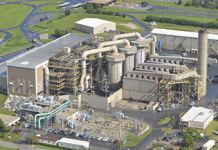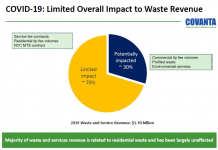by Debra Fiakas CFA
Renewable energy companies have to worry about flagging commodity prices that make it even more difficult to prove the competitive potential of alternative fuels, as well as possible disruption in the capital markets and valuation multiples which are concerns of all public companies.
Shlomi Palas, the CEO of Blue Sphere, Inc. (BLSP: OTC/QB), a microcap in the Crystal Equity Research coverage group, is not dissuaded. He continues to push forward with the company’s strategy to own and operate biofuel-powered, grid-connected generation facilities. Blue Sphere has two food-waste-to-energy plants under construction in the U.S. in North Carolina and Rhode Island. The company is also pushing forward with two additional ‘greenstart’ biogas plants. Management is working to secure a power purchase agreement for a 5.2 megawatt plant planned near Middleboro, MA, where local governments are keen on keeping food waste out of landfills. Another waste-to-energy biogas plant is planned near Ramat Chovav, Israel. The project would for the first time give Blue Sphere an operating presence in its home country.
It is never easy for developmental-stage companies like Blue Sphere to bring the vision into focus for investors. With first electricity sales from its North American projects still months away, Blue Sphere is buying four operating biogas plants in Italy, each with a capacity of one megawatt of power and each with a strong power purchase agreement in place. With closing the Italy plants could deliver Blue Sphere’s first sales to its top-line. In the company’s quarterly financial report management reveals the continued, but quite protracted odyssey to closing.
Blue Sphere has arranged financing for the Italy power plants acquisitions, putting it in 100% ownership of the plants. However, to move forward with the two North American food-waste-to-energy projects, the company entered into a joint venture with a U.S. investment fund. In the end Blue Sphere will lay claim to 25% and 22.5% of the North Carolina and Rhode Island joint ventures, respectively. The arrangement might have been disappointing to some shareholders who had expected Blue Sphere to retain equity control over the projects. However, the reality of U.S. capital markets in general and renewable energy financing in particular, has been challenging.
In 2014, there had been a 17% increase in world renewable energy investment, bringing total new capital to $270 billion for the year. This was just short of the peak in global investment of $279 billion reached in 2011. The rebound was due in part to the achievement of an inflection point of sorts. In 2013, the world added 143 gigawatts of renewable electricity capacity compared to the addition of 141 gigawatts of new plants that burn fossil fuels. It was the first time that renewable fuel additions outpaced fossil fuel additions. Bloomberg Energy Finance group estimates renewable energy additions could grow by more than four times by the year 2030, leaving new fossil fuel power plants far behind. The trend is driven in part by the dramatic decline in the price of wind and solar power sources.
However, in the near-term the falling price of oil has given some investors pause in considering biofuel alternatives for power generation. It is clouding the investment pitches made by executives like Palas who head up smaller, unproven companies. It is vital to keep perspective. In the long term oil, at least oil that is paying its way in environmental cost, cannot compete with renewable fuel sources for power generation.
Oil may be at a low in its cycle and that may be impacting world business. The specter of oil barrels being sold off for $40 may have rattle some enough to divest of U.S. equities. However, the entrepreneurial spirit keeps the eyes of Palas and his fellow biofuel development colleagues glued to the horizon, where the price of oil has no relevance in a world powered by renewables.
Debra Fiakas is the Managing Director of Crystal Equity Research, an alternative research resource on small capitalization companies in selected industries.
Neither the author of the Small Cap Strategist web log, Crystal Equity Research nor its affiliates have a beneficial interest in the companies mentioned herein. BLSP is featured in research reports published by Crystal Equity Research. Please note the important disclosures at the end of all Crystal Equity Research reports. Please read the important disclosures related to sponsorship and subscriptions in the final pages of all reports.







